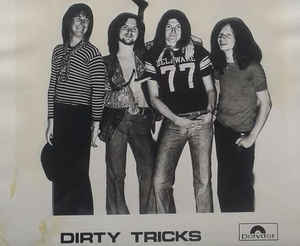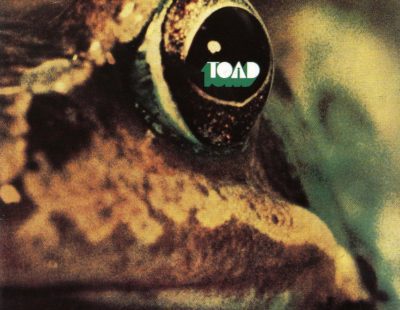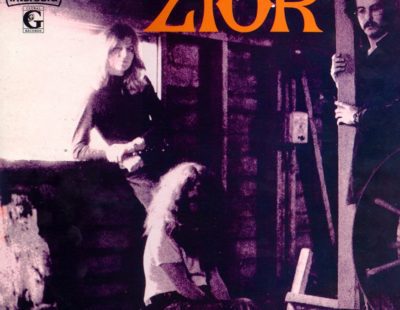
Primitive Origins is a column where we’ll look back at proto-metal and early metal that deserves a bit of your battered eardrum’s attention. We’re keeping it loose and easy here: there’s no strict guidelines other than it’s gotta be old, it helps if it’s obscure, and it’s gotta rock out surprisingly hard for its context. Pscyh-ed out proto-metal from the late ’60s? Of course. Early attempts at doom metal from the ’70s? Hell yeah. Underground Soviet metal from the early ’80s? Sure. Bring it on. Bring it all on.
We spend a lot of time in the early-to-mid ’70s in Britain in this here column, but there was a lot of proto-metal happening then and there, and the more we dig around, the more we seem to come across. For example, Dirty Tricks, whose self-titled debut from 1975 we’ll spend some time with this week.

The band put out three albums; their debut mainly rocks steady and classic, but features two very worthy proto-doom contenders well worth your time. (For the record, 1976’s Night Man rocks tight and concise but not quite as heavy; reeks of superstardom and makes one wonder why it didn’t happen. Features two songs that were also on the debut, including the opener, which is super annoying and confusing. 1977’s Hit and Run is good when it’s heavier, approaching Judas Priest levels at points, but without the majesty; elsewhere, though, it feels tentative of which way to go.)
Here on the self-titled, opener “Wait Till Saturday” rocks four on the floor, hard and controlled, reminding me of a Freedom Rock compilation that may or may not only exist in my mind. It’s more Free than Sabbath but it’s undeniably good rock.
But then the second cut, “Back off Evil,” comes along and slows down the pace to a sluggish Sabbath crawl, and things get heavy. Even just based on this song alone, the band proves this album has Primitive Origins worthiness. Love that soulful vocal performance, and the dragging drum display is excellent as well. The huge riff makes the most of empty spaces and it all comes together to form a very convincing proto-doom experience. This album is well worth exploring for this song alone, which is a really cool, and very heavy, slab of proto heaviness.
“Sunshine Day” backs off on the doom to lay down a more rockin’, Bad Company/Led Zep sound. It’s not wildly heavy, but it’s heavy enough, and it’s certainly capable ’70s hard rock. “If You Believe In Me” ends off the original album’s side A as a pretty convincing acoustic ballad; it’s short and to the point, and actually kinda works. The band then picks up the boogie for side B with “Too Much Wine,” which has an opening riff to end all opening riffs. It’s awesome, and although by this point the discerning proto-metalhead is getting concerned that the heavy factor established early on side A with “Back off Evil” may never return, this song is an undeniable, feel-good ’70s rocker (the vocal/guitar back-and-forth is very, very Zep, which can get tiring, but damned if it doesn’t work).
“Call Me Up for Love” finds the band getting less Sabbatherian and more Rolling Stonesian, but hitting that sweet spot where the Stones totally killed it (which, according to my calculations, was one album, but opinions, which are generally wrong, vary). Good slinking trash-rock riff, memorable vocal line, drums pounding away behind the very nicely crashing and fuzzy production… in a sense, I feel like I’ve heard this song a million times before, but in another sense, cue it up for my impending funeral, man, because this is as good as rock and roll gets. (Note: also reminds me of something KISS would have put on Rock and Roll Over, which is 100-percent good in my books.)
“Marcella” features an outrageous vocal performance and is an interesting enough rock song, and at track seven of eight, it just sort of leaves the listener wondering what’s going to come last? A brisk rocker? A ballad? Are they going to blow minds and get really heavy again?
Amazingly, it’s the latter, closer “High Life” threatening to start off as dull blues, something proto-metal bands were all too often guilty of doing, but the song instead turns into a heavy, sludgey—and, sure, bluesy—proto-doom number, the band mining the depths for the album closer, a bold move indeed. Some would call it blues, but listen to that guitar, the heaviness of the riff, and the intensity of the drumming; musically this echoes Neurosis more than John Lee Hooker, and that’s awesome. “I like the high life, and so should you,” belts out stoned vocalist Kenny Stewart, giving a very convincing performance on what I can only assume is a song about how awesome smoking weed is. Not sure, but this is an awesome, heavy, and powerful way to end this album, that’s for damn sure. Play it loud, mutha.
Dirty Trick’s Dirty Tricks – The Decibel breakdown:
Do I need to be stoned to listen to this?: Nope. Solid proto-metal here, no dull parts to test anyone’s patience.
Heaviness factor: When Dirty Tricks are serious about it, they’re not as heavy as Jerusalem at their heaviest, but heavier than Sabbath at their mellowest (ballads not included). All told, an impressive amount of sonic heft lurks in songs like “Back off Evil.”
Obscura Triviuma: Two very cool metal notes here. First off, remember that totally screwed-up album cover for First Visit by that band no one remembers for any reason except for their totally screwed-up album cover for First Visit, Rogue Male? They featured Dirty Tricks guitarist John Binnie. Also, three members of Dirty Tricks would go on to jam with Ozzy as he was getting his solo band together, making them one of metal’s great coulda-beens.
Other albums: 1976’s Hard Man and 1977’s Hit and Run (re-released with their self-titled album in one self-titled triple-CD package from Majestic Rock in 2005).
Related bands: Vardis, Renia, Scarlet, Rogue Male, Grand Prix, Stairway to Zeppelin (Dirty Tricks as a Led Zeppelin cover band).
Alright, fine, if you must: The last song is basically about how rad getting stoned is, so light one up.






